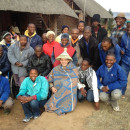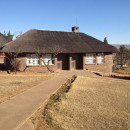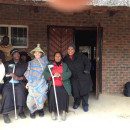Hands on Learning and Cultural Experience Past Review
By Jeremy M (Business Administration, Management and Operations., Brigham Young University) - abroad from 05/14/2012 to 08/03/2012 with
Brigham Young University: Various - Individual Experience Program
I gained communication skills, observation skills, cultural experience, insight into how nonprofit organizations work, insight into the disability sector, and insight into the responsibilities/difficulties of an Administrator.
Review Photos



Personal Information
| How much international exposure did you have prior to this program? | 6 months+ |
Review Your Program
|
* Overall educational experience
Academic rigor, intensity, resources, etc. |
I think the experience here is what you make of it. I was the most educated out of those I worked with. If I wished, I could have been relaxed or lazy. On the other hand, I also had the opportunity to teach as I learned and improve the organization. The biggest downside was the lack of internet connection. I often went to town to do research/email (This should no longer be a problem, as they were installing internet at the time of my departure. To find out for sure, you can email the office at itjareng@gmail.com) |
|
* Host Country Program Administration
On-site administration of your program |
The IVTC Administration was very good to work with. They gave me access to information about their program so I could easily learn what I was working with. They were very open in sharing their ideas and were also willing to hear my ideas. |
|
* Housing:
How satisfied were you with your living arrangements? |
Housing includes running water and plumbing. It is very cold in winter and there is no insulation or central heating in the homes. (Remember that winter in the Southern Hemisphere is opposite to that of the States) |
| * Food: |
I liked the food a lot. Papa (maize meal mush) and Moroho (spinach) with Chicken is the most common meal. Just about everything tastes good, and I would recommend you try everything at least once. The one thing I did not enjoy was Malemakholu (intestine) |
|
* Social & Cultural Integration:
How integrated did you feel with the local culture? |
If you make an effort to learn what you can of the language/culture, you will be loved. I was completely immersed in the culture. There are enough English speakers that speak well enough that you can easily get by. However, Lesotho is very homogenous in language and culture, and outside of the Centre there are many who speak little to no English. |
|
* Health Care:
How well were health issues addressed during the program? |
There is a good private hospital. I went there when I had a horrible flu. I would advise bringing some diarrhea pills with you, as you never know when you will need it. I did get vaccines to go to Lesotho. I don't remember what the required vaccines were, but you can easily find out at the local county government office or CDC website. |
| * Safety: |
Compared to other places I have been in Southern Africa (Zimbabwe, Botswana, Swaziland, and South Africa), Lesotho is very peaceful and safe. I was informed of some incidents of mugging and violence, but all incidents took place in town after dark. At Itjareng there is a security guard (completely unnecessary in my opinion). The Centre is very safe, as is Masianokeng Village. |
| If you could do it all over again would you choose the same program? |
Yes
|
Finances
|
* Money: How easily were you able to live on a student's budget?
(1 = not very easy/$200+ on food & personal expenses/week, 2.5 = $100/week, 5 = very easily/minimal cost) |
You will live for much less than you are accustomed to. Food is very inexpensive in Lesotho, particularly if you eat the local cuisine. Transportation is R5 ($.75 or so) to get to town or to go anywhere around town. You can spend $25 a week and survive. Depending on what you eat, how often you travel, and what you do for entertainment, it is still possible to spend $100-150 in a week. I probably spent $30-$35 a week. |
| * Was housing included in your program cost? | Yes |
| * Was food included in your program cost? | No |
| Not including program expenses, about how much money did you spend on food and other expenses each week? | $30-$35 |
| Do you have any general money-saving tips for future study abroad participants? | Eat the local food. It is much cheaper, and you will enjoy the cultural experience. |
Language
| * Did your program have a foreign language component? | Yes |
|
How much did the program encourage you to use the language?
0 = No encouragement, 5 = frequent encouragement to use the language |
They didn't expect any level of Sesotho fluency whatsoever, but they did encourage me to learn what I could and were very willing to tutor me. There is also a sign language component to help you communicate with the Deaf students. |
| How would you rate your language skills at the beginning of the program? | Beginner |
| How would you rate your language skills at the end of the program? | Beginner |
| What was the highest level language course you had completed prior to departure? | I had not (and still have not) taken any formal course in Sesotho. |
| How many hours per day did you use the language? | |
| Do you have any tips/advice on the best ways to practice the language for future study abroad participants? | Ask how to say common phrases, write them down, and practice them. |
Other Program Information
|
* Where did you live?
Select all that apply |
|
|
* Who did you live with?
Select all that apply |
|
|
* Who did you take classes with?
Select all that apply |
|
| About how many local friends did you make that you will likely keep in touch with? | 10+ |
A Look Back
| * What did you like most about the program? |
|
| * What could be improved? |
|
| * What do you know now that you wish you knew before going on this program? | I wish that I had known more about fundraising in the nonprofit sector. In my classes I have only learned about selling goods and services for a profit. |








